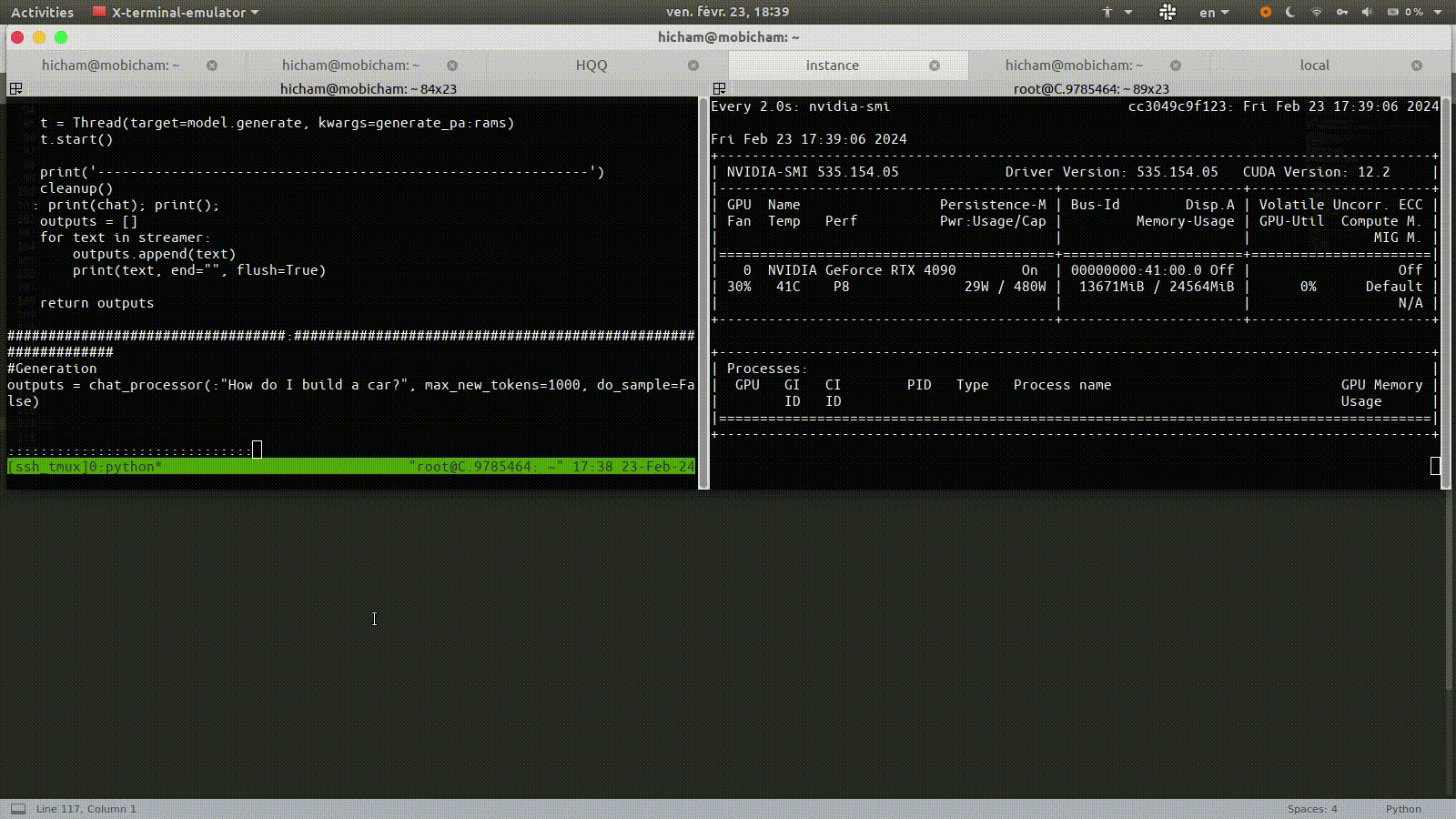Mixtral-8x7B-Instruct-v0.1-hf-attn-4bit-moe-2bit-metaoffload-HQQ
This is a version of the Mixtral-8x7B-Instruct-v0.1 model quantized with a mix of 4-bit and 2-bit via Half-Quadratic Quantization (HQQ). More specifically, the attention layers are quantized to 4-bit and the experts are quantized to 2-bit.
The difference between this model and our previous release is that this one offloads the metadata to the CPU and you only need 13GB Vram to run it instead of 20GB!
Note: this model was updated to use a group-size of 128 instead of 256 for the scale/zero parameters, which slightly improves the overall score with a negligible increase in VRAM.
Performance
| Models | Mixtral Original | HQQ quantized |
|---|---|---|
| Runtime VRAM | 94 GB | 13.5 GB |
| ARC (25-shot) | 70.22 | 66.55 |
| Hellaswag (10-shot) | 87.63 | 84.83 |
| MMLU (5-shot) | 71.16 | 67.39 |
| TruthfulQA-MC2 | 64.58 | 62.80 |
| Winogrande (5-shot) | 81.37 | 80.03 |
| GSM8K (5-shot) | 60.73 | 45.41 |
| Average | 72.62 | 67.83 |
Screencast
Here is a small screencast of the model running on RTX 4090
Basic Usage
To run the model, install the HQQ library from https://github.com/mobiusml/hqq and use it as follows:
import transformers
from threading import Thread
model_id = 'mobiuslabsgmbh/Mixtral-8x7B-Instruct-v0.1-hf-attn-4bit-moe-2bit-metaoffload-HQQ'
#Load the model
from hqq.engine.hf import HQQModelForCausalLM, AutoTokenizer
tokenizer = AutoTokenizer.from_pretrained(model_id)
model = HQQModelForCausalLM.from_quantized(model_id)
#Optional: set backend/compile
#You will need to install CUDA kernels apriori
# git clone https://github.com/mobiusml/hqq/
# cd hqq/kernels && python setup_cuda.py install
from hqq.core.quantize import *
HQQLinear.set_backend(HQQBackend.ATEN_BACKPROP)
def chat_processor(chat, max_new_tokens=100, do_sample=True):
tokenizer.use_default_system_prompt = False
streamer = transformers.TextIteratorStreamer(tokenizer, timeout=10.0, skip_prompt=True, skip_special_tokens=True)
generate_params = dict(
tokenizer("<s> [INST] " + chat + " [/INST] ", return_tensors="pt").to('cuda'),
streamer=streamer,
max_new_tokens=max_new_tokens,
do_sample=do_sample,
top_p=0.90,
top_k=50,
temperature= 0.6,
num_beams=1,
repetition_penalty=1.2,
)
t = Thread(target=model.generate, kwargs=generate_params)
t.start()
outputs = []
for text in streamer:
outputs.append(text)
print(text, end="", flush=True)
return outputs
################################################################################################
#Generation
outputs = chat_processor("How do I build a car?", max_new_tokens=1000, do_sample=False)
Quantization
You can reproduce the model using the following quant configs:
from hqq.engine.hf import HQQModelForCausalLM, AutoTokenizer
model_id = "mistralai/Mixtral-8x7B-Instruct-v0.1"
model = HQQModelForCausalLM.from_pretrained(model_id, use_auth_token=hf_auth, cache_dir=cache_path)
#Quantize params
from hqq.core.quantize import *
attn_prams = BaseQuantizeConfig(nbits=4, group_size=64, offload_meta=True)
experts_params = BaseQuantizeConfig(nbits=2, group_size=16, offload_meta=True)
zero_scale_group_size = 128
attn_prams['scale_quant_params']['group_size'] = zero_scale_group_size
attn_prams['zero_quant_params']['group_size'] = zero_scale_group_size
experts_params['scale_quant_params']['group_size'] = zero_scale_group_size
experts_params['zero_quant_params']['group_size'] = zero_scale_group_size
quant_config = {}
#Attention
quant_config['self_attn.q_proj'] = attn_prams
quant_config['self_attn.k_proj'] = attn_prams
quant_config['self_attn.v_proj'] = attn_prams
quant_config['self_attn.o_proj'] = attn_prams
#Experts
quant_config['block_sparse_moe.experts.w1'] = experts_params
quant_config['block_sparse_moe.experts.w2'] = experts_params
quant_config['block_sparse_moe.experts.w3'] = experts_params
#Quantize
model.quantize_model(quant_config=quant_config, compute_dtype=torch.float16);
model.eval();
The code in github at https://github.com/mobiusml/hqq/blob/master/examples/hf/mixtral_13GB_example.py
- Downloads last month
- 5

